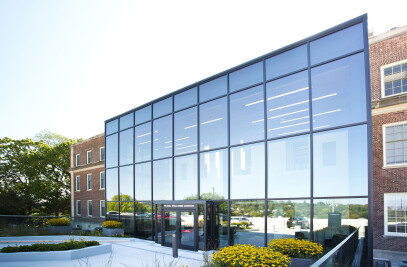The hut in a recreational area near Prague has an unusual shape and appearance. The asymmetrical tent-like roof is truncated and finished with a pair of skylights. Originally, there was a simple one-story hut with a basement and a low-pitched roof built in the 1970s. A married couple from Prague bought the land for a "city escape," not just for weekends but also for working from home. They were enchanted by the peaceful location amidst nature, surrounded by a garden and mature trees.




They eagerly anticipated their retreat from city noise and even took a gardening course, but the building was in very poor technical condition. Additionally, it did not meet their spatial needs as they wanted to expand the ground-floor room with an attic bedroom. However, the zoning plan did not allow new construction, and the height was limited to a maximum of 7.7 meters from the surrounding terrain. The only solution was a complete renovation that would enlarge the house and comply with the requirements of authorities and neighbors.





Architect Martin Hajný took on the challenge and designed an unusual building with a truncated hip roof. The reason was to minimize height and be considerate of the neighbors, ensuring the roof shape did not disrupt their view of the landscape. The original hut was reduced to its stone base, upon which the new metal structure stands. The main construction is a two-by-four system, diffusely open structure on a reinforced concrete slab, which is set on reinforced concrete pillars hidden behind stone walls. The roof and facade are clad in trapezoidal metal sheeting, a low-maintenance material with a long lifespan that resembles wooden battens.

While the dark exterior helps the building blend into its surroundings, the interior is bright and evokes a classic hut with its predominance of wood. The pine plywood used, with its pronounced grain, extends from the ceiling panels to the walls and all furniture. It contrasts with the facade and is practical as it allows more light into the interior. The bathroom features a subtle grey plaster on the floor and walls.



From the ground floor, there are views of the surroundings through large-glazed areas oriented to the south and east. The simple layout allowed the use of facade windows on all sides. The truncated hip roof, on the other hand, remained uniform from the outside; any insertion of a window would have disturbed the simplicity of the house as seen from the outside. The bedroom is therefore illuminated by a pair of opening skylights from above. The skylights create an interesting meditative space and allow rapid chimney ventilation of the whole building. Combined with the significant roof overhang over the southern part, this ensures a pleasant indoor climate all year round.



















































